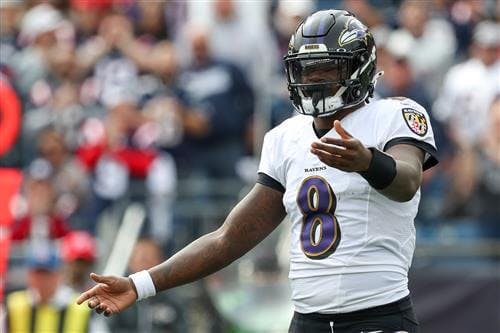
The latest chapter in the Lamar Jackson saga featured the Ravens’ PR staff trying to shut down any questions about the franchise’s disgruntled quarterback during a pre-draft news conference Wednesday. At one point when the two-time Pro Bowler was mentioned by a reporter, they were cut off mid-question as Ravens head coach John Harbaugh and general manager Eric DeCosta sat in silence.
Despite the team’s attempts to drive the conversation back toward the draft, questions about Jackson were still asked — and warranted — considering how his trade request last month could affect the team’s plans when the draft begins April 27. Jackson was the last pick of the first round in 2018 and became the league MVP the next year, putting himself in line for a big payday that would have made him Baltimore’s unquestioned franchise QB. But for over a year, he and the Ravens haven’t been able to agree on an extension, and although the team says that hasn’t changed its pre-draft evaluation process, it would be naive to think it’s not at least a factor.
“It just depends on the board,” DeCosta said, asked whether he’d consider selecting a QB in the first round. “I guess I’d have to say yes because we have quarterbacks in our top 31. So just based on that alone, simple math, I would have to say yes.”
Jackson’s situation is not just unusual, it’s unprecedented. The 26-year-old, who does not have an agent, has reportedly rejected multiple contract extension offers with the hope of landing a deal on par with the fully guaranteed $230 million contract Deshaun Watson received from the Browns last season. Baltimore responded by placing the nonexclusive franchise tag on Jackson that allows other teams to negotiate with him, but so far, no other teams have made a real attempt to land him. If a team were to extend Jackson an offer sheet, Baltimore would have five days to match before letting him go in exchange for two first-round picks.
To better understand Jackson’s predicament, I spoke with former Saints and Dolphins GM Randy Mueller, who was the 2000 NFL executive of the year. Mueller is also the co-host of “The Football GM” podcast alongside The Athletic’s Mike Sando. We discussed the pros and cons of other teams pursuing Jackson, the difficulty of negotiating without an agent and how waiting until after the draft could jumpstart Jackson’s market.
What are some of the general pros and cons of pursuing Lamar Jackson?
“He is skilled and an elite athlete at a position that’s really, in this day and age, more important than ever. He has shown he can carry a team. He’s been the face of a franchise and has proven to be good at it. On the football side, the pushback would be: Is it a style that’s sustainable because of the way that he plays? Cartwheeling into the end zone after you score, no matter what anybody says, that’s probably not recommended (laughs jokingly). But off the field: the awkwardness of no agent, the commitment of potentially a fully guaranteed deal, two first-round picks, a change in style of 99 percent of the offenses in the league — that’s a giant pivot for most teams. It’s the off-the-field, the business side of it, that really makes it a hard deal to make.”